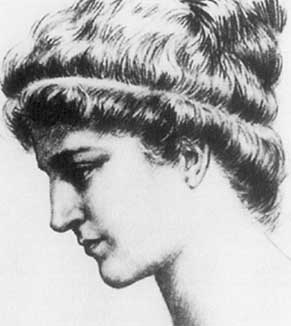Dit bericht is geplaatst op zaterdag 25 oktober 2008 om 14:00 in categorieën Vallende sterren. Je kunt de reacties volgen via een RSS 2.0 feed. Je kunt een reactie plaatsen, of een trackback van je eigen site plaatsen.
Wiskundemeisjes
Ionica & Jeanine
Vallende sterren (9)
In Vallende sterren, door Jeanine
Deze keer in onze rubriek over wiskundigen die op een originele manier aan hun einde zijn gekomen: Hypatia van Alexandrië (ongeveer 370 - 415). Van Hypatia weten we zelfs beter hoe ze stierf dan wat voor wiskunde ze deed.

Hypatia is de bekendste vrouwelijke wiskundige uit de oudheid. Ze leefde in Alexandrië (Egypte) en was de dochter van filosoof en wiskundige Theoon van Alexandrië. Waarschijnlijk kreeg ze les van haar vader. Rond het jaar 400 werd ze hoofd van de Platonische school in Alexandrië, waar ze les gaf in de wiskunde en de filosofie, vooral in wat tegenwoordig bekend staat als het neoplatonisme. Ze werd beschouwd als een charismatisch docent en ze stond ook bekend om haar schoonheid. Hoewel Hypatia ook christelijke leerlingen had (waaronder Synesius van Cyrene die later zelfs bisschop werd), werd ze door de christenen van die tijd als heidens beschouwd.
Er is geen origineel wiskundig werk van Hypatia bekend, maar wel weten we dat ze haar vader assisteerde bij het schrijven van zijn commentaar bij de Almagest van Ptolemaeus, en waarschijnlijk ook bij zijn herziene versie van de Elementen van Euclides. Zelf schreef ze commentaren bij de Arithmetica van Diophantos, de Kegelsneden van Apollonius en misschien ook bij andere astronomische werken van Ptolemaeus. Op de titels en enkele verwijzingen na is al het werk van Hypatia verloren gegaan.
De politieke situatie was erg instabiel. Orestes, de Romeinse prefect van Alexandrië en dus wereldlijk heerser, en Cyrillus, de patriarch en dus de christelijke leider van Alexandrië waren verwikkeld in een machtsstrijd. Hypatia was bevriend met Orestes. Ze werd het onderwerp van rellen tussen christenen en niet-christenen, en in 415 werd ze door een menigte fanatieke christenen op gruwelijke wijze vermoord. Ze werd naar een kerk gebracht, uitgekleed en door de straten gesleept. Er zijn bronnen die vertellen dat haar huid werd afgeschraapt met schelpen of scherven (het Griekse woord dat gebruikt wordt kan dat allebei betekenen) en dat ze in brand gestoken werd, maar volgens andere bronnen gebeurde dat toen ze al dood was.
Enkele Engelse vertalingen van beschrijvingen van deze gruwelijke gebeurtenis staan op wikipedia:
Socrates Scholasticus (vijfde eeuw):
Yet even she fell a victim to the political jealousy which at that time prevailed. For as she had frequent interviews with Orestes, it was calumniously reported among the Christian populace, that it was she who prevented Orestes from being reconciled to the bishop. Some of them therefore, hurried away by a fierce and bigoted zeal, whose ringleader was a reader named Peter, waylaid her returning home, and dragging her from her carriage, they took her to the church called Caesareum, where they completely stripped her, and then murdered her by scraping her skin off with tiles and bits of shell. After tearing her body in pieces, they took her mangled limbs to a place called Cinaron, and there burnt them.
Johannes van Nikiû (zevende eeuw):
And in those days there appeared in Alexandria a female philosopher, a pagan named Hypatia, and she was devoted at all times to magic, astrolabes and instruments of music, and she beguiled many people through Satanic wiles...A multitude of believers in God arose under the guidance of Peter the magistrate...and they proceeded to seek for the pagan woman who had beguiled the people of the city and the prefect through her enchantments. And when they learnt the place where she was, they proceeded to her and found her...they dragged her along till they brought her to the great church, named Caesarion. Now this was in the days of the fast. And they tore off her clothing and dragged her...through the streets of the city till she died. And they carried her to a place named Cinaron, and they burned her body with fire.
En de interpretatie van de achttiende-eeuwse Engelse historicus Edward Gibbon zegt:
A rumor was spread among the Christians, that the daughter of Theon was the only obstacle to the reconciliation of the prefect and the archbishop; and that obstacle was speedily removed. On a fatal day, in the holy season of Lent, Hypatia was torn from her chariot, stripped naked, dragged to the church, and inhumanly butchered by the hands of Peter the Reader and a troop of savage and merciless fanatics: her flesh was scraped from her bones with sharp oyster-shells and her quivering limbs were delivered to the flames.
 Internetbureau Rotterdam
Internetbureau Rotterdam 
